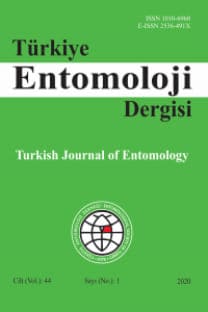Farklı sayıda gerçek yapraklı döneme sahip domates fidelerinin Meloidogyne incognita (Kofoid & White, 1919) Chitwood, 1949’ya tepkileri
Biyolojik test, Meloidogyne, domates fidesi, reaksiyon
Response of tomato seedlings with different number of true leavesto Meloidogyne incognita (Kofoid & White, 1919) Chitwood, 1949
Bioassay, Meloidogyne, tomato seedling, reaction,
___
- Abad, P., B. Favery, M. N. Rosso & P. Castagnone-Sereno, 2003. Root-knot nematode parasitism and host response: Molecular basis of a sophisticated interaction. Molecular Plant Pathology, 4 (4): 217–224.
- Bird, A. F., 1967. Changes associated with parasitism in nematodes. I. Morphology and physiology of preparasitic and parasitic larvae of Meloidogyne javanica. The Journal of Parasitology, 768-776.
- Devran, Z. & M. A. Söğüt, 2009. Distribution and identification of root-knot nematodes from Turkey. Journal of Nematology, 41: 128-133.
- Devran, Z. & M. A. Söğüt, 2011. Characterizing races of Meloidogyne incognita, M. javanica and M. arenaria in the West Mediterranean region of Turkey. Crop Protection, 30: 451-455.
- Devran, Z., B. Başköylü, A. Taner & F. Doğan, 2013. Comparison of PCR-based molecular markers for identification of Mi gene. Acta Agriculturae Scandinavica, Section B - Soil & Plant Science, 45: 395-402.
- Devran, Z. & M. A. Söğüt, 2014. Response of heat-stable tomato genotypes to Mi-1 virulent root-knot nematode populations. Turkish Journal of Entomology, 38: 229-238.
- Hooper D. J., 1986. “Handling, Fixing, Staining and Mounting Nematodes, 58-80”. In: Laboratory Methods for Work with Plant and Soil Nematodes, (Eds: J.F. Southey) Her Majesty’s Stationery Office, London. 202 pp.
- Huang, C. S., 1985. “Formation, Anatomy and Physiology of Giant Cells Induced by Root-Knot Nematodes, 155-164”. In: An Advanced Treatise on Meloidogyne, Vol. 1, (Eds: J. N. Sasser & C. C. Carter), Raleigh: North Carolina State University Graphics, 223 pp.
- Hussey, R. S. & C. W. Mims., 1990. Ultrastructure of esophageal glands and their secretory granules in root-knot nematode Meloidogyne incognita. Protoplasma, 156: 9-18.
- Karssen, G. & M. Moens., 2006. “Root-Knot Nematodes. 59-90” In: Plant Nematology, (Eds: R. N. Perry & M. Moens), CABI, London, 447 pp.
- Khan, H., R. Ahmad, A. S. Akhtar, A. Mahmood, T. Basit, & T. Niaz, 2000. Effect of inoculum density of Meloidogyne incognita and plant age on the severity of root-knot disease in tomato. International Journal of Agriculture & Biology, 2000 (02): 360–363.
- Melillo, M. T., P. Leonetti, M. Bongiovanni, P. Castagnone‐Sereno & T. Bleve‐Zacheo, 2006. Modulation of reactive oxygen species activities and H2O2 accumulation during compatible and incompatible tomato–root‐knot nematode interactions. New Phytologist, 170 (3): 501-512.
- Ramsay, K., Z. Wang & M. G. K. Jones, 2004. Using laser capture microdissection to study gene expression in early stages of giant cells induced by Root‐Knot Nematodes. Molecular Plant Pathology, 5 (6): 587-592.
- Schomaker, C. H. & T. H. Been, 2006. “Plant Growth and Population Dynamics, 275-301”. In: Plant Nematology, (Eds: R.N. Perry & M. Moens), British Library, London, UK, 447 pp.
- Seah, S., V. M. Williamson, B. E. Garcia, L. Mejía, M. S. Salus, C. T. Martin & D. P. Maxwell, 2007. Evaluation of a co-dominant SCAR marker for detection of the Mi-1 locus for resistance to root-knot nematode in tomato germ plasm. Tomato Genetic Cooperative Report, 57: 37–40.
- Shane, W. W. & K. R. Barker, 1986. Effects of temperature, plant age, soil texture, and Meloidogyne incognita on early growth of soybean. Journal of Nematology, 18 (3): 320-327.
- Wesemael, W. M. L., N. Viaene & M. Moens, 2006. The influence of root diffusate and host age on hatching of the root-knot nematodes, Meloidogyne chitwoodi and M. fallax. Nematology, 8 (6): 895-902.
- Wesemael, W. M. L., R. N. Perry & M. Moens, 2011. Root-knot nematodes (Meloidogyne spp.) in Europe. Nematology, 13 (1): 3-16.
- Williamson, V. M., 1998. Root-knot nematode resistance genes in tomato and their potential for future use. Annual Review of Phytopathology, 36: 277-293
- Williamson, V. M., 1999. Plant nematode resistance genes. Plant Biology, 2: 327–331.
- ISSN: 1010-6960
- Yayın Aralığı: 4
- Başlangıç: 1977
- Yayıncı: Galip KAŞKAVALCI
Zübeyir DEVRAN, Tevfik ÖZALP, İbrahim MISTANOĞLU
Response of some beneficial insect species to colored sticky traps in citrus
Serkan PEHLİVAN, Serdar SATAR, Ekrem ATAKAN
Şahin KÖK, İsmail KASAP, İşıl ÖZDEMİR
Turunçgilde faydalı böceklerin yapışkan renkli tuzaklara tepkileri
Ekrem ATAKAN, Serkan PEHLİVAN, Serdar SATAR
Hülya ALTUNTAŞ, Sümeyra Nur DEMİRCİ ŞANAL, Emine DUMAN, Ekrem ERGİN
Mohammad Maroof SHAH, Saira KHAN, Raza AHMAD, İhsan Ul HAQ
Zübeyir DEVRAN, İbrahim MISTANOĞLU, Tevfik ÖZALP
